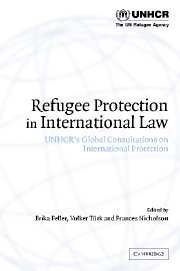Book contents
- Frontmatter
- Contents
- List of annexes
- Notes on contributors and editors
- Foreword
- Preface
- Acknowledgments
- Expert roundtables and topics under the ‘second track’ of the Global Consultations
- Table of cases
- Table of treaties and other international instruments
- List of abbreviations
- Part 1 Introduction
- Part 2 Non-refoulement (Article 33 of the 1951 Convention)
- Part 3 Illegal entry (Article 31)
- Part 4 Membership of a particular social group (Article 1A(2))
- Part 5 Gender-related persecution (Article 1A(2))
- 5.1 Gender-related persecution
- 5.2 Summary Conclusions: gender-related persecution, expert roundtable, San Remo, September 2001
- 5.3 List of participants
- Part 6 Internal protection/relocation/flight alternative
- Part 7 Exclusion (Article 1F)
- Part 8 Cessation (Article 1C)
- Part 9 Family unity (Final Act, 1951 UN Conference)
- Part 10 Supervisory responsibility (Article 35)
- Index
5.2 - Summary Conclusions: gender-related persecution, expert roundtable, San Remo, September 2001
Published online by Cambridge University Press: 28 August 2009
- Frontmatter
- Contents
- List of annexes
- Notes on contributors and editors
- Foreword
- Preface
- Acknowledgments
- Expert roundtables and topics under the ‘second track’ of the Global Consultations
- Table of cases
- Table of treaties and other international instruments
- List of abbreviations
- Part 1 Introduction
- Part 2 Non-refoulement (Article 33 of the 1951 Convention)
- Part 3 Illegal entry (Article 31)
- Part 4 Membership of a particular social group (Article 1A(2))
- Part 5 Gender-related persecution (Article 1A(2))
- 5.1 Gender-related persecution
- 5.2 Summary Conclusions: gender-related persecution, expert roundtable, San Remo, September 2001
- 5.3 List of participants
- Part 6 Internal protection/relocation/flight alternative
- Part 7 Exclusion (Article 1F)
- Part 8 Cessation (Article 1C)
- Part 9 Family unity (Final Act, 1951 UN Conference)
- Part 10 Supervisory responsibility (Article 35)
- Index
Summary
The San Remo expert roundtable addressed the question of gender-related persecution and the 1951 Convention Relating to the Status of Refugees, basing the discussion on a background paper by Rodger Haines QC, Refugee Status Appeals Authority of New Zealand, entitled ‘Gender-Related Persecution’. In addition, roundtable participants were provided with written contributions from Justice Catherine Branson, Federal Court of Australia, Deborah Anker, Harvard Law School, Karen Musalo and Stephen M. Knight, Hastings College of Law, University of California, and the World Organization Against Torture. Participants included thirty-three experts from twenty-three countries, drawn from governments, NGOs, academia, the judiciary, and the legal profession. Deborah Anker, from Harvard Law School, moderated the discussion.
The following summary conclusions do not represent the individual views of each participant or necessarily of UNHCR, but reflect broadly the understandings emerging from the discussion.
The Convention is, inter alia, founded on the principle that human beings shall enjoy fundamental rights and freedoms without discrimination. Because men, women, and children can experience persecution in different ways, Article 1A(2) demands an inquiry into the specific characteristics and circumstances of the individual claimant. Accordingly, the below understandings follow:
The refugee definition, properly interpreted, can encompass gender-related claims. The text, object, and purpose of the Refugee Convention require a gender-inclusive and gender-sensitive interpretation. As such, there would be no need to add an additional ground to the Convention definition.
[…]
- Type
- Chapter
- Information
- Refugee Protection in International LawUNHCR's Global Consultations on International Protection, pp. 351 - 352Publisher: Cambridge University PressPrint publication year: 2003
- 1
- Cited by

